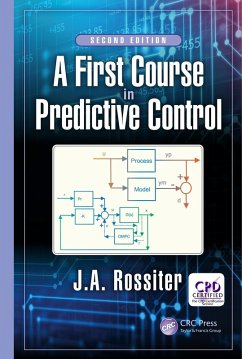The book is an excellent starting point for readers to gain a solid grounding in MPC concepts and algorithms before moving into application or more advanced research topics. Sample problems are embedded throughout the chapters, and in-text questions are designed for readers to demonstrate an understanding of concepts through numerical simulation.
Dieser Download kann aus rechtlichen Gründen nur mit Rechnungsadresse in A, B, BG, CY, CZ, D, DK, EW, E, FIN, F, GR, HR, H, IRL, I, LT, L, LR, M, NL, PL, P, R, S, SLO, SK ausgeliefert werden.
"The book seems to be one of the first in presenting teaching level concepts of predictive control. Indeed, it is a view from industrial point of view since it discusses the PFC which was one of the first ideas of predictive control in the 70s. Since then, of course, things evolved drastically with the computational power, allowing a fiddler's paradise of predictive control algorithms and designs, and some of the most popular are mentioned in the book (GPC, DMC). I find it commendable of the author, a well-established scholar in our community, to pursue such a project, and I am very happy to promote it. I myself am teaching predictive control and I already have found that the content of this book (as it is at this moment in time) is very useful and approachable for engineering students.
The comparison with PID controller is of course necessary and justified, since 95% of the loops in industry are indeed performed by PID controllers. The remaining ones need optimization and thus predictive control has gained a broad access in manufacturing and process industry. I believe the section "why is predictive control logical" will stir and stimulate a lot of brainstorming sessions in both academia and research community, which is very nice indeed. The examples and overall structure of the book is excellently constructed to allow step-by-step systematic teaching structure and thus enhancing the potential impact on the student's learning curve. The supplementing with Matlab code is very useful indeed. The pedagogical skills exercised by the author are indeed expected since he is an active member in control education community.
Overall, this book bears a significant added value to the academic and why not, the research community."
- Clara Mihaela Ionescu, Ghent University, Belgium
The comparison with PID controller is of course necessary and justified, since 95% of the loops in industry are indeed performed by PID controllers. The remaining ones need optimization and thus predictive control has gained a broad access in manufacturing and process industry. I believe the section "why is predictive control logical" will stir and stimulate a lot of brainstorming sessions in both academia and research community, which is very nice indeed. The examples and overall structure of the book is excellently constructed to allow step-by-step systematic teaching structure and thus enhancing the potential impact on the student's learning curve. The supplementing with Matlab code is very useful indeed. The pedagogical skills exercised by the author are indeed expected since he is an active member in control education community.
Overall, this book bears a significant added value to the academic and why not, the research community."
- Clara Mihaela Ionescu, Ghent University, Belgium


